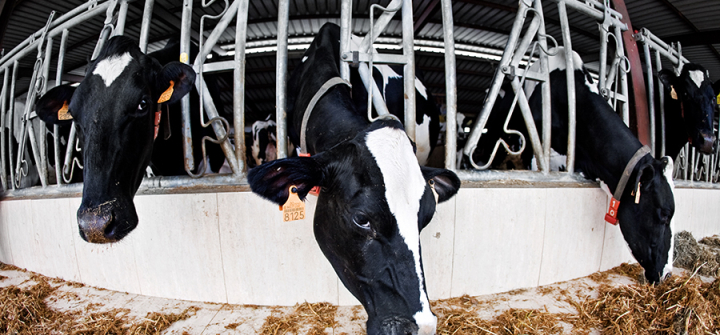Factory Farms Feed 3 Top Health Threats
By tackling factory farming, the WHO could fight all 3 of the “slow-motion disasters” outlined by outgoing WHO Director-General Margaret Chan, MD at last year’s World Health Assembly (WHA): climate change, antibiotic resistance and noncommunicable diseases threatening global health.
After a decade of service, Chan is about to hand the reins over to Tedros Adhanom Ghebreyesus, PhD. Ethiopia’s former minister of health and of foreign affairs will be the first African to ever head the organization, and the global health community has been quick to congratulate Tedros after his election during the WHA in May. But it’s also clear that the new Director-General and the WHO will face tough challenges—such as chronic underfunding, aggravated by concerns over the reliability of one of its largest donors, the US government.
To address the wide-ranging and forbidding challenges to global health with limited funding, WHO will need to set smart priorities—and factory farming is a public health crisis that belongs on that agenda, we and 270 experts and academics argue in an open letter published during the WHA. Signatories include philosophers Noam Chomsky, Peter Singer and Norman Daniels, NYU Professor for Nutrition Marion Nestle, Director of the John Hopkins Center for Health Security Tom Inglesby, Pulitzer-prize winning health journalist Laurie Garrett and former German Minister for Agriculture and Consumer Protection Renate Künast.
WHO estimates that climate change will cause an additional 250,000 deaths per year between 2015 and 2030. Over the next decades, food-related greenhouse gas emissions may take up most of the world’s carbon budget—the amount of gases we can emit without raising global temperatures by more than 2° degrees Celsius by 2050. Animal farming contributes the vast majority of food-related emissions, through the gas emissions of livestock and through the massive deforestation needed to clear land for grazing and growing feed-crops. If we just limited our meat consumption worldwide to health guideline recommendations, food-related greenhouse gas emissions could drop 29-45%.
Antibiotic resistance kills 700,000 people each year—a number that could skyrocket up to 9.5 million by 2050. Agricultural policy will be key to addressing this threat: In the EU and US, over 75% of antibiotics are used in agriculture, not medicine. Farmers deploy low dosages of antibiotics to keep animals alive in confined settings and to promote growth, making factory farms ideal settings for the emergence of new resistant strains. Moreover, it turns us into second-hand consumers of antibiotics we don’t need, through the animal products we eat and through environmental pollution from animal waste. Furthermore, the growth of factory farming in middle income countries could dramatically increase antibiotic resistance: Brazil, Russia, India, China and South Africa, the so-called BRICS countries and home to 40% of the world population, are projected to experience a 99% growth in the consumption of antibiotics by 2030, largely due to factory farming.
Cheap meat and animal products have fundamentally altered our diets and contribute to rising noncommunicable, chronic diseases. High meat consumption has been shown to increase risks for several types of cancer, stroke, obesity, cardiovascular mortality, lung disease and diabetes. WHO now classifies processed meat as carcinogenic and red meat as “probably carcinogenic.” While the past years have seen remarkable progress on infectious diseases such as AIDS, malaria and polio, the chronic disease burden keeps rising. WHO now estimates that 70% of all deaths are caused by chronic diseases, a share projected to rise over the next years. WHO calls chronic diseases “a 2-punch blow for development” because they don’t just cause premature deaths, they also tax health systems and patients’ productivity.
The WHO has taken on industry and consumer choices before: its Framework Convention on Tobacco Control successfully promoted anti-smoking policies across the world, such as taxes and warning labels. Last year, WHO recommended a tax on sugary drinks to fight unhealthy diets. Similar approaches could be adopted with factory farming.
Along with funding hurdles, Tedros will also have to overcome silos and work with other sectors—and reducing factory farming will produce progress on some of the most urgent threats to world health. Moreover, it is a goal that both invites and requires partnership—with the environment and development sector, industry and member states.
Tedros could also leverage his role as WHO’s first African Director-General and the former minister of one of the world’s poorest countries to address the fact that global meat consumption and its dangerous consequences are a threat especially for the world’s poorest. A threat that is deeply unjust: it’s rich countries that consume, and poor countries that suffer the consequences. Average daily meat consumption in high-income countries is 224g, but only 31g in Africa. Yet rising antibiotic resistance and chronic disease will strain poor countries’ health systems the most. And it’s poor and tropical countries that are most immediately affected by the droughts, food insecurities and natural disasters brought on by climate change. Right now, famines in Yemen, South Sudan, Somalia and Nigeria threaten the lives of 20 million people, in what the UN humanitarian chief Stephen O’Brien has called the worst humanitarian crisis in the history of the UN. The famines’ causes are complex, but rising global temperatures likely contributed to the severe droughts preceding them.
Taking office this summer, Tedros will have the opportunity to set a new agenda for the World Health Organization. Factory farming should be on it.
Sophie Hermanns is a PhD candidate in Politics and International Studies at the University of Cambridge. She is active on Twitter.
Scott Weathers is a Master of Science Candidate in Global Health and Population at the Harvard T.H. Chan School of Public Health and the associate project director of Charity Science: Health. He is active on Twitter.
Join the thousands of subscribers who rely on Global Health NOW summaries and exclusive articles for the latest public health news. Sign up for our free weekday enewsletter, and please share the link with friends and colleagues: Subscribe to GHN
iStock




